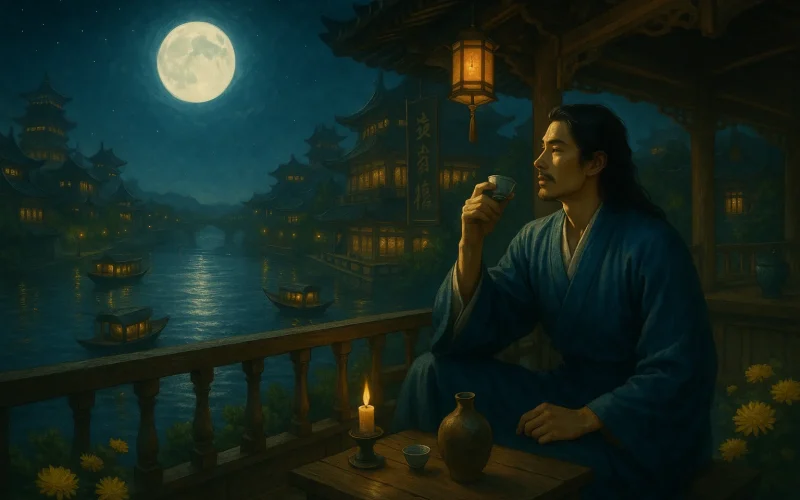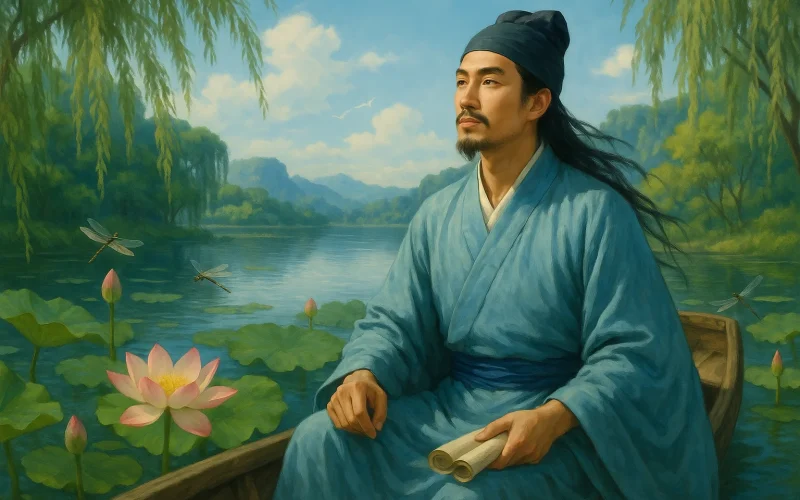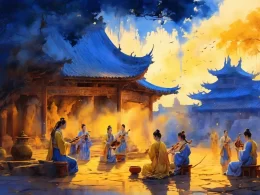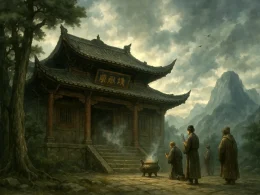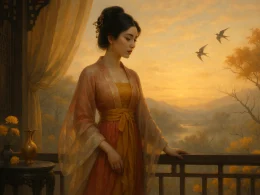I wish you were like the moon o’er riverside tower,
North, south, east, west—
North, south, east, west—
Following me every hour, never apart.
I hate you for being like that moon so bright,
Waxing full then waning—
Waxing full then waning—
When will your perfect circle reunite?
Original Poem
「采桑子 · 恨君不似江楼月」
吕本中
恨君不似江楼月,南北东西,南北东西,只有相随无别离。
恨君却似江楼月,暂满还亏,暂满还亏,待得团圆是几时?
Interpretation
Composed during the twilight of the Northern Song, this lyric by Lü Benzhong exemplifies the era's mastery of emotional restraint. Through lunar metaphor and structural parallelism, it captures a woman's lament—at once reproachful and yearning—for an absent lover. The poem's brilliance lies in its dual paradox: the moon is both idealized as constant companion and reviled as fickle orb, mirroring love's contradictions with crystalline precision.
First Stanza: "恨君不似江楼月,南北东西,南北东西,只有相随无别离。"
Hèn jūn bù sì jiāng lóu yuè, nán běi dōng xī, nán běi dōng xī, zhǐ yǒu xiāng suí wú biélí.
I resent you for not being
like the moon over riverside towers—
east, west, south, north,
east, west, south, north—
ever following, never parting.
The opening salvo ("I resent you") subverts tradition by addressing the lover directly. The moon—typically a passive symbol of longing—here becomes an active standard of fidelity. The quadruple directional repetition ("east, west, south, north") mimics both the moon's omnipresence and the lover's restless wandering, while the final line's negation ("never parting") underscores absence through idealized presence.
Second Stanza: "恨君却似江楼月,暂满还亏,暂满还亏,待得团圆是几时?"
Hèn jūn què sì jiāng lóu yuè, zàn mǎn hái kuī, zàn mǎn hái kuī, dài dé tuányuán shì jǐ shí?
I resent you for being
like the moon over riverside towers—
waxing only to wane,
waxing only to wane.
When will fullness return?
The counter-stanza's brilliance lies in its mirrored structure. Where the first "resentment" craves constancy, the second decries cyclical abandonment. The repeated "waxing only to wane" (暂满还亏) embodies love's ephemeral peaks, while the unanswered question ("When will fullness return?") suspends hope in perpetual limbo.
Holistic Appreciation
This lyric constructs a perfect emotional diptych. The first panel elevates the moon as paradigm of steadfastness; the second condemns it as emblem of impermanence. This duality reflects the Song psyche—simultaneously Confucian in its desire for constancy and Daoist in its acceptance of flux.
The river tower moon (江楼月), observed from a fixed vantage point, becomes a celestial Rorschach test: its meaning shifts with the speaker's mood. The directional chant ("east, west, south, north") and lunar phases ("waxing/waning") create rhythmic waves that mirror the woman's oscillating emotions.
Artistic Merits
- Dialectical Imagery
The moon serves as both positive and negative exemplar—a rhetorical pivot that encapsulates love's ambivalence. - Kinetic Repetition
The directional litany and phase cycles generate momentum, enacting the lover's wanderings and time's passage. - Architectonic Symmetry
The two-stanza structure forms a conceptual chiasmus: idealization (stanza 1) deconstructed by reality (stanza 2). - Submerged Geography
The river tower (江楼)—neither fully natural nor entirely man-made—symbolizes the liminal space between hope and resignation.
Insights
Lü's poem reveals how longing distorts perception: the same moon is either loyal companion or capricious betrayer. This cognitive dissonance—wanting simultaneously the eternal and the ephemeral—lies at love's core. The lyric's enduring power stems from its refusal to resolve the paradox; like the moon itself, it remains suspended between perfect circle and partial shadow.
For contemporary readers, it models how to articulate complex emotions without simplification. The woman's dual resentment acknowledges love's fundamental impossibility—to be both constant and passionate—while still daring to ask "when will fullness return?"
About the Poet
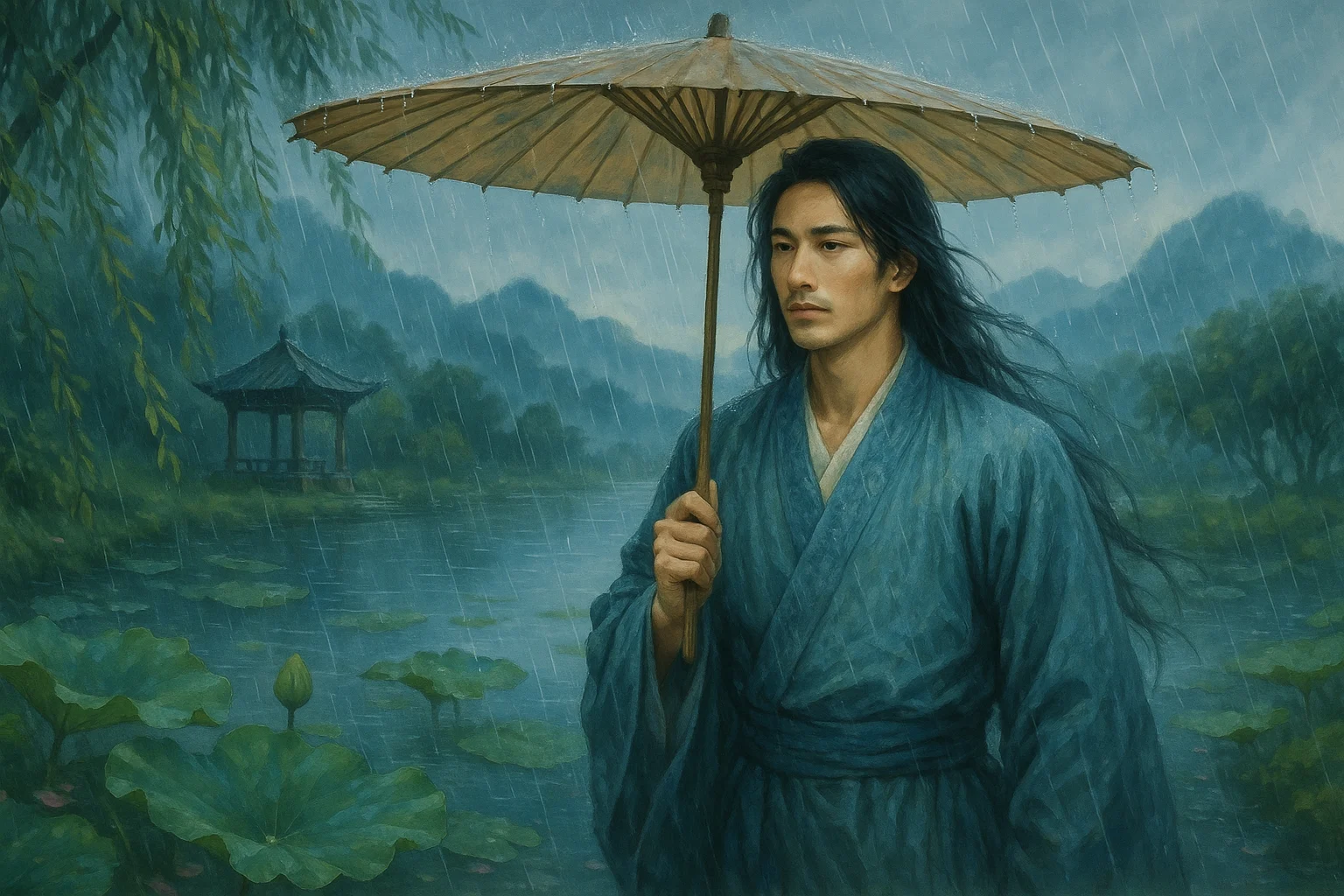
Lü Benzhong (吕本中 1084 - 1145), a native of Shouxian in Anhui, was a renowned poet and Neo-Confucian scholar of the Southern Song Dynasty. As a key theorist of the Jiangxi Poetry School, he proposed the concept of "living method" (huofa), advocating for natural variation within established poetic rules. With over 1,270 surviving poems, his Genealogy of the Jiangxi Poetry School (Jiangxi Shishe Zongpai Tu) established Huang Tingjian as the school's patriarch, profoundly influencing Song poetic theory and serving as a bridge between the Jiangxi School and the Four Masters of the Mid-Song Revival.







